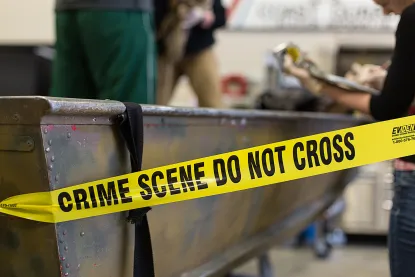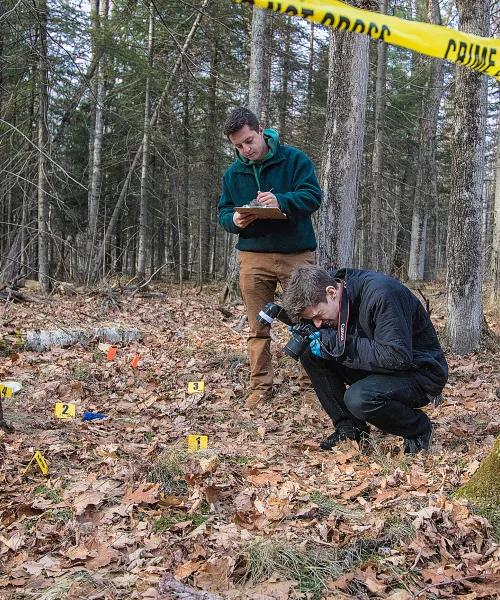Minor
Northern Michigan University's 20-credit Crime Scene Investigation Minor teaches specialized expertise in evidence collection, criminal investigations, and evidence processing with law enforcement and the forensic community. Students will learn essential skills in crime scene investigation techniques, evidence handling, and criminal justice procedures, as well as the foundation of how different evidence is collected. The coursework will provide practical skills that are crucial for careers in law enforcement, forensic science, and related fields.
Program Benefits
- Faculty with field experience: Lexie Belles has extensive hands-on experience from her time working with the State of Wisconsin Crime Laboratory System, and Chris MacMaster brings valuable insights from his tenure with the Michigan State Police.
- Hands-on learning: Students will gain practical, real-world experience through hands-on learning.
- Career preparation: By introducing this minor, NMU's Criminal Justice Department seeks to equip students for various dynamic and demanding roles in the criminal justice and forensic sectors. This program addresses the evolving needs of these fields, ensuring that graduates are job-ready and stand out in competitive job markets.
What will you learn?
Students in the crime scene investigation minor program will learn how to...
- Analyze evidence
- Process evidence
- Critical thinking and problem-solving
- Consider ethical considerations in the criminal justice and forensic fields.
Undergraduate Programs
Undergraduate programs that would benefit from a minor in crime scene investigation include...
Criminal Justice (any area), Forensic Biochemistry, Forensic Anthropology, Biology, Nursing, Clinical Lab Science, Loss Prevention, Psychology, Social Work, Sociology, Chemistry, STEM fields, Art & Design, Cybersecurity, Computer Science
The minor in Crime Scene Investigation requires a minimum of 20 credits from the required and elective coursework.
For more information, contact:
Lexie Belles, Instructor
lbelles@nmu.edu
906-227-1617
Certificate Program
The coursework for the Crime Scene Investigation certificate includes 16 credit hours of study that provide foundational instruction in criminal investigative techniques, forensic disciplines, crime scene analysis, and evidence processing. The CSI certificate is available to help credential and aid in the professional development of students who seek to gain entry-level employment in law enforcement, investigations, or forensic science-related fields.
To add this certificate, first be sure you are on the Fall 2024 Catalog. Then do the following:
Email degaudit@nmu.edu and CC your Success Advisor and Lexi Belles in the Criminal Justice Department (lbelles@nmu.edu).
In the email include 1) your full name and IN#, 2) that you are following the 2024 Catalog 3) that you want to add the CSI Certificate, and 4) the semester you expect to graduate.
What will you learn?
Students in the crime scene investigation minor program will learn...
An overview of the criminal justice system
Knowledge of criminal investigation techniques
Crime scene documentation processes
How to process, preserve, and collect forensic evidence
The scope and course of death investigations
Programs or Career Paths
Undergraduate degrees or careers that will benefit from the crime scene investigation certificate program include...
Police Academy, forensic biochemistry, anthropology, biology, chemistry, psychology, cyber defense, and criminal justice majors
For more information, contact:
Chris McMaster
906-227-2660
cmacmast@nmu.edu
Admissions Criteria
Admissions Criteria
- Freshman (first-year)
- High school graduation with grade point average of 2.25 or higher (4.0 scale) (or equivalent GED completion).
Transfer Students Admissions Criteria
- Cumulative college grade point average of 2.00 (4.0 scale) in all college-level courses taken after high school graduation/GED;
- Eligible to return to the last institution attended;
- High school GPA requirements must also be met if the applicant has earned fewer than 12 college-level credits after high school graduation.

Northern Today Article
Northern Michigan University's Criminal Justice Department will begin offering a new crime scene investigation (CSI) certificate this fall. The 16-credit program provides foundational instruction in criminal investigative techniques, forensic disciplines, crime scene reconstruction and evidence processing. The credential will benefit students who seek to gain entry-level employment in related fields.

